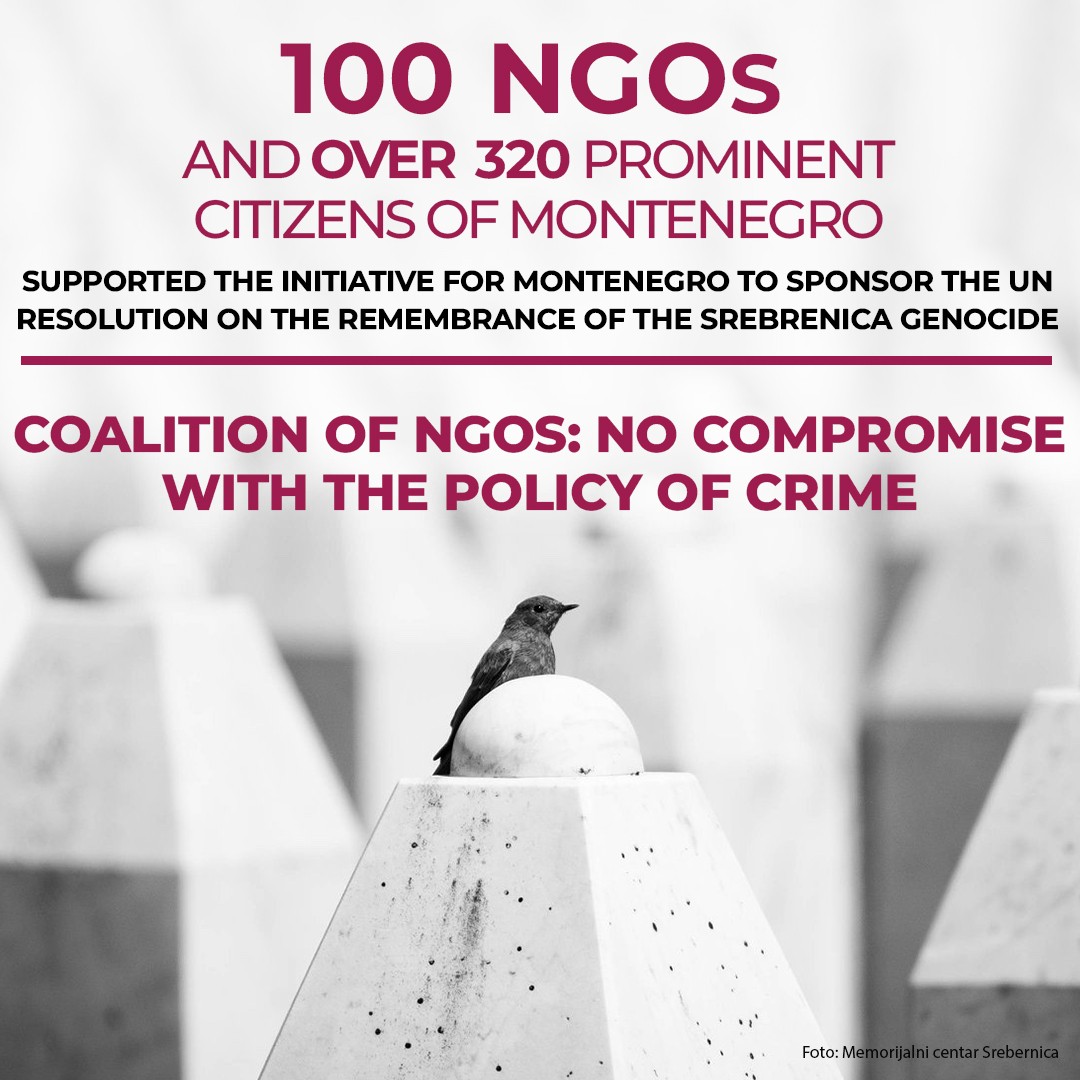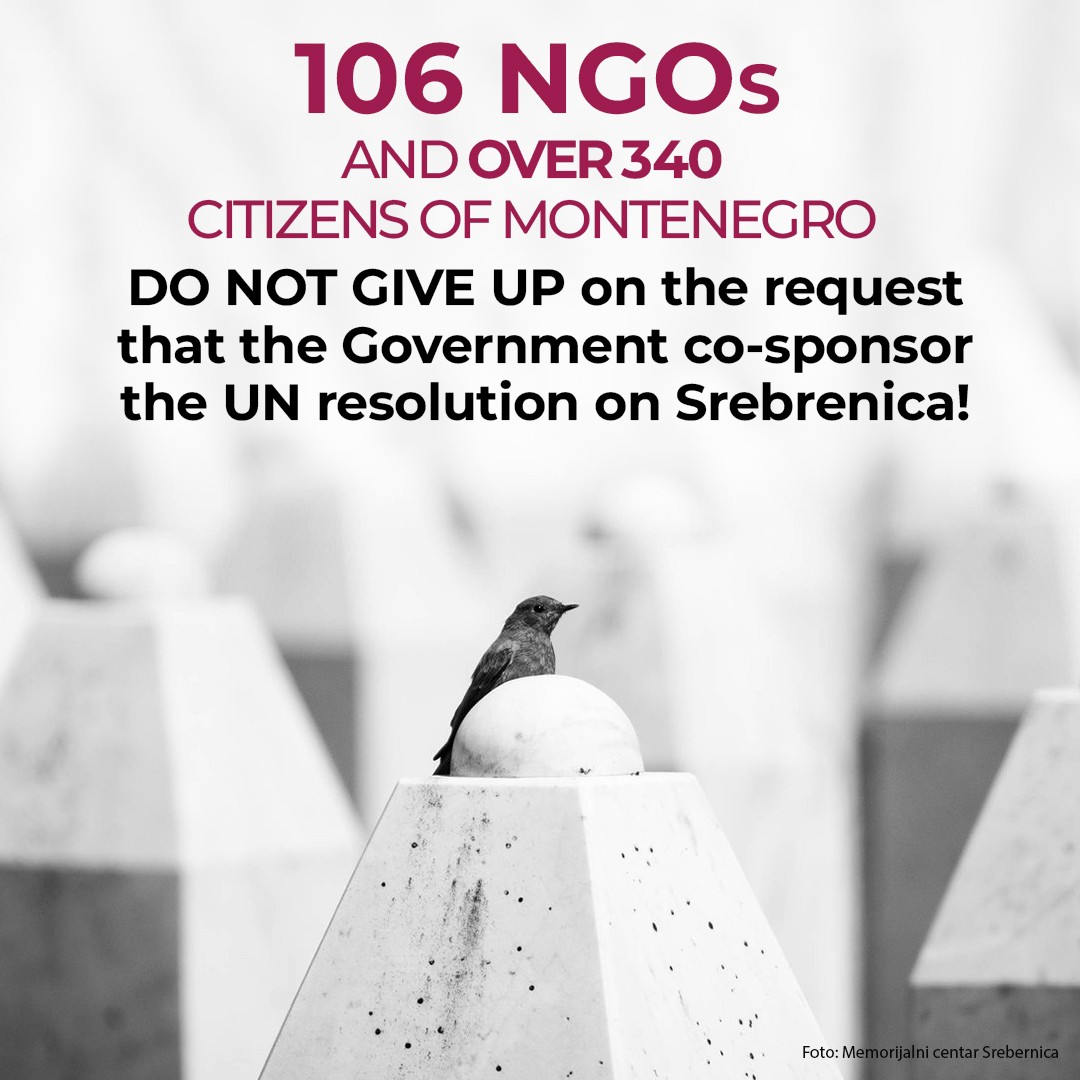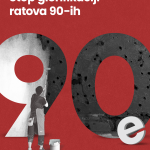
Coalition of NGOs: No Compromise with the Policy of Crime
30/04/2024
Over 100 NGOs and 340 citizens of Montenegro DO NOT GIVE UP on the request that the Government co-sponsor the UN resolution on Srebrenica!
06/05/2024THE CONTROVERSIAL PROPOSAL OF GIVING PAVLE BULATOVIĆ A CITY STREET HAS BEEN FORWARDED TO THE MINISTRY

On 30 April, the eve of the holiday, the Council charged with proposing the names of settlements, streets and squares of the capital of Podgorica decided to submit to the Ministry of Culture and Media the proposal of a Democratic councilor to name one of the streets of the city after Pavle Bulatović, the war Minister of the Interior and Defence. The Ministry is now to provide a statement on whether the proposal meets the prominent person criteria prescribed by the Law on Monuments. The Human Rights Action (HRA), the Centre for Civic Education (CGO) and the Centre for Women’s and Peace Education (ANIMA) believe that this decision of the Council is another example of unacceptable calculations with the war policies of the 1990s. If it wishes to be admitted to the European Union, Montenegro must more decisively demonstrate its ability to contribute to sustainable peace in the region, and this approach is harmful both to the Montenegrin society and meaningful regional cooperation.
Regarding this issue, non-governmental organisations HRA, CGO and ANIMA wrote to Aleksa Bečić, the leader of Democratic Montenegro and Deputy Prime Minister, urging him to prevent further processing of the proposal that was submitted by his own party’s councillors. The letter was supported by 23 Montenegrin non-governmental organisations, but Bečić never responded to it.
The session of the Council was attended by representatives of HRA and CGO. President of the Council, Boris Pejović, from the Europe Now Movement (PES), allowed the HRA representative Elizabeta Mrnjačević to present arguments against the proposal, but she was not allowed to reply to the councillors who opposed them.
Mrnjačević presented the well-known arguments of CGO, HRA and Anime that, in the capacity of Minister of the Interior, Pavle Bulatović ordered the crime of deportation of refugees from Bosnia and Herzegovina at the end of May 1992, as determined by the final judgment of the High Court in Podgorica no. Ks. 6/12, dated 22 November 2012 (available on the portal sudovi.me). Said order meant that 66 persons of Bosniak nationality were handed over to be murdered by the likes of Ratko Mladić and Radovan Karadžić. Only 12 of them survived the extradition. Pavle Bulatović was also the subject of investigation in other crimes, for which people under his command were suspected while he was serving as the Minister of Defence of FR Yugoslavia. Bulatović was assassinated in Belgrade in 2000, under unexplained circumstances.
Mrnjačević also pointed out that publicly honouring Pavle Bulatović would imply glorification of the war crime of Deportation, sending a bad message to future generations. She drew attention to the councillors’ responsibility when proposing persons that can further polarise society.
Six councillors from the Democrats, the New Serbian Democracy (NSD), the Democratic Party of Socialists (DPS) and the Bosniak Party (BS) participated in the discussion.
Councillors Mitar Vuković and Mitar Šušić strongly reacted to Mrnjačević’s presentation. Vuković, from the Democrats, who was among the proponents, said that “there is no evidence to condemn this procedure” and that “the Democrats proudly nominated Pavle Bulatović”, stating that “his biography and behaviour can serve as an example for future generations”. His party colleague Vladimir Vujović was of a similar opinion. He accepted the thesis that this was a “mistake of the state”, but said that “when the state makes a mistake, it is not just one individual, so the entire top of the state must be responsible”. Mitar Šušić assessed that the NGOs’ narrative was “hollow and devoid of legal grounds”. He also added that “Bulatović was the Minister of the Interior at a challenging time in history” and that he “acted based on his own discretion, the law or orders”. He emphasised the importance of understanding the circumstances of the time when these decisions were made and that “we cannot judge his actions only from today’s standpoint”. He also said that he did not want this proposal to become a “platform for expressing ideologies” and that, if the proposal is adopted, the NGOs would probably organise “performances, where they would take down or break the board bearing Bulatović’s name”.
Zoja Bojanić Lalović, councillor from the DPS, said that proposals for assigning street names “should bring us together, not divide us”, emphasising that it was obvious that there was a reaction from the public since no less than 23 NGOs responded. Mihailo Andjušić, also from DPS, pointed out that “the situation is debatable, to say the least”, and that the position of 23 NGOs should be respected. Addressing the proponents, he concluded that “it remains to be seen whether they were right, just like it remains to be seen whether you are right”.
Edin Tuzović, councillor from the BS, assessed that “the 1990s were what they were”, and added that he believes that more time should pass before the streets can be named after people from that period.
Since some councillors have asked for evidence, we point out that the entire court file from the Deportation case is available at the following link, clearly showing that refugees from Bosnia and Herzegovina were deported to be killed on the orders of Pavle Bulatović.
In the end, out of 12 members of the Council, 9 voted for in favour of the proposal, including PES, while DPS and BS refrained from voting.
Our organisations believe that there are no legal conditions for a street in Podgorica to be named after Bulatović.
At the same time, we express regret that such a proposal was submitted at all, and that the highest officials are not allowed to publicly show how they feel about issues that indicate their values and commitment to the Europeanisation of the country.
Human Rights Action (HRA)
Centre for Civic Education (CGO)
ANIMA – Centre for Women’s and Peace Education







 English
English Montenegrin
Montenegrin